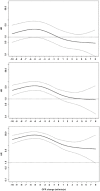Epidemiology of CKD Regression in Patients under Nephrology Care
- PMID: 26462071
- PMCID: PMC4604085
- DOI: 10.1371/journal.pone.0140138
Epidemiology of CKD Regression in Patients under Nephrology Care
Abstract
Chronic Kidney Disease (CKD) regression is considered as an infrequent renal outcome, limited to early stages, and associated with higher mortality. However, prevalence, prognosis and the clinical correlates of CKD regression remain undefined in the setting of nephrology care. This is a multicenter prospective study in 1418 patients with established CKD (eGFR: 60-15 ml/min/1.73m²) under nephrology care in 47 outpatient clinics in Italy from a least one year. We defined CKD regressors as a ΔGFR ≥0 ml/min/1.73 m2/year. ΔGFR was estimated as the absolute difference between eGFR measured at baseline and at follow up visit after 18-24 months, respectively. Outcomes were End Stage Renal Disease (ESRD) and overall-causes Mortality.391 patients (27.6%) were identified as regressors as they showed an eGFR increase between the baseline visit in the renal clinic and the follow up visit. In multivariate regression analyses the regressor status was not associated with CKD stage. Low proteinuria was the main factor associated with CKD regression, accounting per se for 48% of the likelihood of this outcome. Lower systolic blood pressure, higher BMI and absence of autosomal polycystic disease (PKD) were additional predictors of CKD regression. In regressors, ESRD risk was 72% lower (HR: 0.28; 95% CI 0.14-0.57; p<0.0001) while mortality risk did not differ from that in non-regressors (HR: 1.16; 95% CI 0.73-1.83; p = 0.540). Spline models showed that the reduction of ESRD risk associated with positive ΔGFR was attenuated in advanced CKD stage. CKD regression occurs in about one-fourth patients receiving renal care in nephrology units and correlates with low proteinuria, BP and the absence of PKD. This condition portends better renal prognosis, mostly in earlier CKD stages, with no excess risk for mortality.
Conflict of interest statement
Figures



References
-
- Kidney Disease: Improving Global Outcomes (KDIGO) CKD Work Group. KDIGO 2012 Clinical Practice Guideline for the Evaluation and Management of Chronic Kidney Disease. Kidney Int Suppl. 2012;3:1–150.
-
- Ruggenenti P, Perna A, Benini R, Bertani T, Zoccali C, Maggiore Q, et al. In chronic nephropathies prolonged ACE inhibition can induce remission: dynamics of time-dependent changes in GFR. Investigators of the GISEN Group. Gruppo Italiano Studi Epidemiologici in Nefrologia, J Am Soc Nephrol 1999, 10(5):997–1006. - PubMed
MeSH terms
LinkOut - more resources
Full Text Sources
Other Literature Sources
Medical
Research Materials
Miscellaneous

